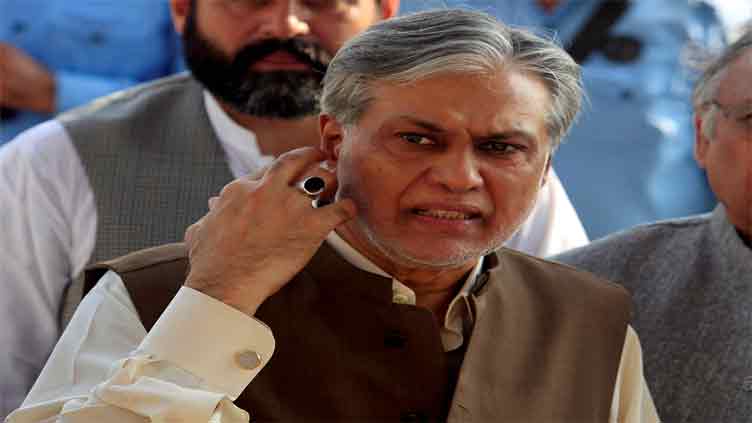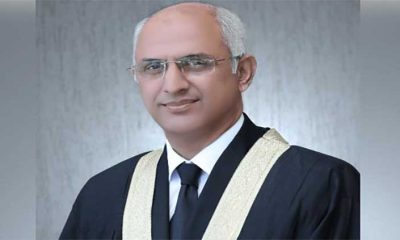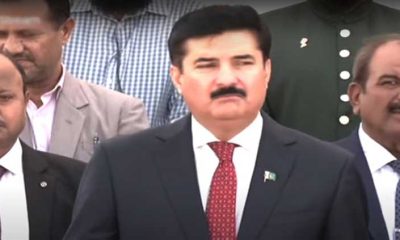Leader of the House in Senate Ishaq Dar on Tuesday categorically rejected the reports about removing the 18th Amendment from the Constitution and added that the PML-N and the PPP had signed the Charter of Democracy in 2006 for bringing reforms in the affairs related judiciary and civil-military relations.
No instructions had been given to the PML-N manifesto committee to review the 18th Amendment, he said, adding, “I want to make it clear again that the 18th Amendment wasn’t even an issue.
Speaking on a point of order in the Upper House of the Parliament, the PML-N leader – who is the closest aide to three-time prime minister Nawaz Sharif – said the 18th Amendment had helped restoring the Constitution which had been defaced by the dictators – thus achieving one of the basic objectives of the Charter of Democracy.
Recalling his role in preparing the ground and finalising the landmark amendment, Dar said PPP leader Raza Rabbani and he remained active in the process.
None of the parties had even finalised their election manifestoes, he said while criticising those spreading the rumours and added that there was no proposal under consideration to dispose of the amendment.
He reminded the House that the National Finance Commission (NFC) Award was revised after a long delay in 2009. The Constitution made it clear that the NFC Award must go through a review after every five years but the exercise hadn’t been repeated, the senior PML-N leader regretted.
At the same time, Dar noted that every political party had right to advocate for constitutional changes according to its policies and goals.
NO PROPOSAL, NO DELIBERATIONS
The latest statement comes a day after Senator Irfan Siddiqui – the head of the PML-N’s manifesto committee – reporters in Islamabad that they had neither received any proposal nor held any deliberations to revisit the 18th Amendment or the NFC Award.
Refuting a report published in an English daily which has triggered the controversy, he said, “According to my information, this matter has never been discussed in any party meeting, nor has the party leadership given any instructions to the manifesto committee in this regard.”
NFC AWARD
The NFC Award as defined in Article 160 of the Constitution is the tool for the tool for distribution of resources among the Centre and provinces.
It has gained even more significance after the 18th Amendment, given the fact that the provinces are now responsible for subjects ranging from education and health to transport and agriculture. They can even go for power generation.
The Article 160 (2) reads: “It shall be the duty of National Finance Commission to make recommendation to the President as to-
(a) The distribution between the Federal and the provinces of the net proceeds of the taxes mentioned in clause (3) [of the constitution];
(b) The making of grants-in-aid by the Federal government to the Provincial government;
(c) The exercise by the federal Government and the Provincial Governments of the borrowing powers conferred by the constitution; and
(d) Any other matter relating to finance referred to the Commission by the President.”
THE CONTROVERSY. FACT OR POLITICS?
Reports have emerged during the past few days about the amendments to the Constitution by reversing the gains made in the favour of the federating units and strengthening the Centre again, in which the PML-N is accused of orchestrating the plan.
However, some circles believe that the rumours are designed to sabotage the PML-N’s endeavours to make inroads in Sindh and Balochistan, as any reversal of provincial autonomy would adversely affect the smaller provinces.
One must keep in mind that the PML-N leadership has always been labelled as Punjab-centric and being aloof to the issues faced by the people living in other parts of the province.
Meanwhile, the MQM-P wants to ensure that the funds transferred to the provinces are shifted to the local governments to meet the basic features of the Constitution – a move strongly resisted by the PPP.
At the same time, empowering the local governments will only strengthen the constitutional rule in the country as enshrined in Article 32 and 140. However, the majority of political leaders are reluctant to devolve the powers to the grass root levels as it would weaken their hold on local politics by controlling development work.
Interestingly, a guaranteed flow of funds to local governments won’t affect the 18th Amendment or the NFC Award, as the money is still supposed to go through the Centre, province and local governments.
Post Views: 87


 Sports3 months ago
Sports3 months ago
 Fashion2 months ago
Fashion2 months ago
 Sports3 months ago
Sports3 months ago
 pakistan3 months ago
pakistan3 months ago
 pakistan3 months ago
pakistan3 months ago
 World2 months ago
World2 months ago
 World2 months ago
World2 months ago
 Sports2 months ago
Sports2 months ago






















